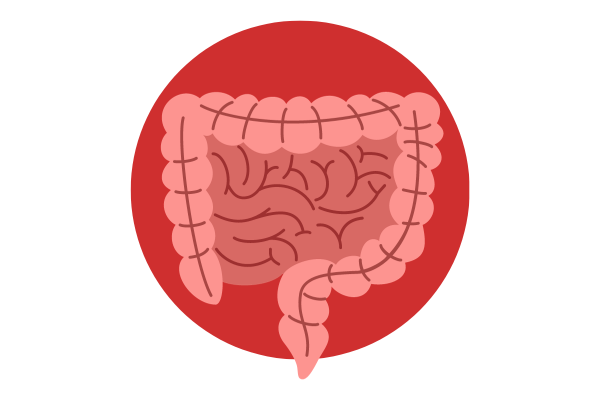The new exciting content of BSG web education is live. Challenge your diagnostic skills and learn from the experts in the field! Endoscopy case series and Bite Size take you through a patient’s case and offer concise and up-to-date knowledge on less common conditions. #takethechallange #takeabite
A Agrawal, Consultant Gastroenterologist and Clinical Director, Doncaster Bassetlaw Teaching Hospitals, Department of Medicine and Gastroenterology, Doncaster Bassetlaw Teaching Hospitals, Armthorpe Road, Doncaster, DN2 5LT, UK1
L A Houghton, Division of Gastroenterology and Hepatology, Mayo Clinic, Jacksonville, FL, USA2, and Co-Lead of the Division of Gastroenterology and Surgical Sciences, Leeds Institute of Medical Research at St James’s, University of Leeds, St James’s University Hospital, Leeds, LS9 7TF, UK3
Case
A 49-year-old female presented with a 15-year history of abdominal pain, bloating with flatulence and rumbling, and altered bowel habit characterised predominantly by constipation. She opened her bowels about twice per week with hard stool and experienced abdominal pain about once per week. She described her bloating as severe with associated distension that worsened as the day progressed. She had a sedentary lifestyle and had recently put on one stone (6 kg) in weight. She had a history of depression, for which she took citalopram. Investigation workup included normal full blood count, urea and electrolytes, liver function, C-reactive protein, tissue transglutaminase IgA, CA125, faecal calprotectin, and faecal immunochemical test, and abdominal/pelvis ultrasound. Ileocolonoscopy with biopsies was normal, and a diagnosis was made of irritable bowel syndrome with constipation (IBS-C). There was a limited response to a trial of low FODMAP diet (i.e. fermentable oligosaccharides, disaccharides, monosaccharide, and polyols), probiotics, Fybogel (Rickett Benckiser, Hull, UK), osmotic and stimulant laxatives, a 5-HT4 agonist, and a variety of antispasmodics. She was commenced on a guanylate-cyclase-C-receptor agonist along with a stimulant laxative, with which her symptoms showed some further resolution.
Author Biographies

Dr Agrawal is a consultant gastroenterologist and clinical director of gastroenterology and endoscopy based at Doncaster & Bassetlaw Hospitals NHS Foundation Trust. He has a special interest in luminal gastroenterology and undertook his PhD in functional bowel disorders at the University of Manchester. He has presented at several scientific meetings and published widely in several high-impact peer reviewed journals. Despite being a busy clinician and manager, he continues to be active in research. Outside work he enjoys reading, travelling, and sport.

Lesley A Houghton PhD FRSB, FACG, AGAF is a Professor of Neurogastroenterology and Co-Lead of the Division of Gastroenterology and Surgical Sciences, Leeds Institute of Medical Research, University of Leeds, UK. She graduated with a special honours degree in biochemistry and physiology from the University of Sheffield and, following a period of research at the University of Adelaide, Australia, gained her PhD. Subsequently, she worked at the Universities of Sheffield and Manchester, UK, before accepting a professorial position at the Mayo Clinic, FL, USA, in 2010. She returned to the UK in 2016, after accepting a Chair in Neurogastroenterology at the University of Leeds. At the national level, she has served as Chairperson to the Neurogastroenterology and Motility Section of the BSG and sat on the editorial board of the peer-reviewed journal Gut. Internationally, she has served on the Rome III Working Team to develop criteria for functional bowel disorders (2006) and Rome IV Working Teams for fundamentals of neurogastroenterology: physiology/motility-sensation and for age, gender and women’s health and the patient (2016).
Q&A
-
Answer ‘d’ is untrue.
The Rome IV criteria define IBS as the presence of recurrent abdominal pain associated with defaecation and change in either stool form or frequency.1 Patients are sub-typed according to their predominant bowel habit into IBS with diarrhoea (IBS-D), IBS-C, IBS with mixed stool form, or IBS unclassified.1 Abdominal bloating and distension are typically present but are not diagnostic of IBS, as these symptoms are common in other functional bowel disorders, such as functional constipation. Although the terms bloating and distension are often used interchangeably by doctors and patients, abdominal bloating should be regarded as a ‘sensation’ of abdominal fullness, whereas distension is a measurable increase in abdominal girth. The two may or may not be associated. Abdominal distension is more likely to occur in patients with IBS-C than IBS-D, and directly correlates with the severity of bloating only in IBS-C.2 Bloating and/or distension often worsen as the day progresses, particularly after meals, and generally improve overnight. In patients with an organic cause for their bloating or distension, there tends to be no diurnal variation. It is important to ask the patient whether they experience abdominal distension, as the mechanisms causing bloating and distension can be different and, therefore, require different management.3‒7
Bloating and distension are not exclusive to IBS, IBS patients with bloating are more likely to report anxiety and/or depression than those without bloating, and weight gain and obesity can be associated with bloating. Thus, weight loss may be part of the management strategy.8,9
-
Answer ‘d’ is true.
Colonic transit time is often delayed in patients with IBS-C and distension. Therapeutic acceleration of transit improves abdominal distension.3,4 Numerous studies have shown IBS patients have no more abdominal gas than healthy controls.5 While distension in patients with intestinal dysmotility disorders is generally related to the volume of intestinal contents, in IBS patients, there is a disproportionately greater increase in girth to volume of intestinal contents. This appears to be because of impaired contraction of the lower rectus and external oblique abdominal muscles along with paradoxical ‘relaxation’ of the internal oblique muscle and ‘contraction’ (descent) of the diaphragm.5
Abdominal distension can be associated with abnormalities in visceral sensitivity, but additional assessments are required, as some studies suggest that visceral hypersensitivity is associated with the sensation of bloating, and hyposensitivity with abdominal distension.6 Other hypotheses are that distension is a behavioural response that involves abnormal activity of the abdominothoracic wall triggered by increased visceral sensitivity to luminal contents.7
-
Answer ‘d’ is true.
The treatment of bloating can be difficult, but with growing understanding of mechanisms, such as those listed above, therapy may be better targeted. Reducing intake of insoluble fibre can improve bloating. Guidance from the National Institute of Health and Care Excellence (NICE)10 also advocates reducing foods such as caffeine, alcohol, carbonated drinks, and gas-producing foods. FODMAP-restricted diets might be effective in the short term in selected patients with bloating,11,12 but additional trials are needed to establish long-term benefit and safety, particular on the colonic microbiome. Therapies which improve transit (e.g. stimulant laxatives, prokinetics) of stool can be considered for treating bloating or distension, where it is associated with constipation. Bulking agents and some osmotic agents, such as lactulose, can cause bloating though retention of water in the intestinal lumen and increased gas production due to fermentation, and should be avoided.12
As incidence of ovarian cancer increases with increasing age, NICE guidance recommends that a CA125 test should only be offered routinely to women with bloating if they are aged 50 years or older and they report persistent (>1 month) or frequent (>12 times a month) abdominal bloating or distension.13 In younger women aged 40‒49 years, among whom incidence of ovarian cancer is 19 per 100,000, CA125 testing should be offered if the index of suspicion is high.13
A systematic review and network meta-analysis suggests that linaclotide 290 μg once daily, lubiprostone 8 μg twice daily, tenapanor 50 mg twice daily, and tegaserod 6 mg twice daily are more effective than placebo for improving abdominal bloating in patients with IBS-C.14 Again, further research is needed to assess long-term efficacy. Trials of gut‒brain modulators, such as tricyclic antidepressants and selective serotonin reuptake inhibitors, have suggested global improvements in IBS and pain, but the benefits in relation to bloating are unproven.15
Rifaximin (off-license use) should be tried only by experienced clinicians where other measures have failed. Trial data suggest some benefit in patients with non-constipated IBS.16 The role of small-intestinal bacterial overgrowth in causing IBS symptoms is controversial due to high false-positive test rates and, moreover, a positive test does not predict the response to treatment.17,18 Guidelines do not advocate the routine use of hydrogen breath testing to assess bacterial growth.19
Further advice on the treatment of IBS can be found in the British Society of Gastroenterology guidelines on the management of irritable bowel syndrome.19
CME
Top to Bottom Podcast - BSG IBD Guideline - De-escalation of Therapy
14 November 2025
Top to Bottom Podcast - BSG IBD Guideline - Methodology
07 November 2025
BSG Webinar: IBD Highlights from BSG LIVE‘25
22 October 2025
- Lacy BE, Mearin F, Chang L, et al. Bowel disorders. Gastroenterology 2016;150:1393-1407.
- Houghton LA, Lea R, Agrawal A, et al. Relationship of abdominal bloating to distension in irritable bowel syndrome and the effect of bowel habit. Gastroenterology 2006;131:1003-1010.
- Agrawal A, Houghton LA, Reilly B, et al. Bloating and distension in irritable bowel syndrome: the role of gastrointestinal transit. Am J Gastroenterol 2009;104:1998-2004.
- Agrawal A, Houghton LA, Morris J, et al. Clinical trial: the effects of a fermented milk product containing Bifidobacterium lactis DN-173 010 on abdominal distension and gastrointestinal transit in irritable bowel syndrome with constipation. Aliment Pharmacol Ther 2009;29:104-114.
- Villoria A, Azpiroz F, Burri E, et al Abdomino-phrenic dyssynergia in patients with abdominal bloating and distensión. Am J Gastroenterol 2011;106:815-819.
- Agrawal A, Houghton LA, Lea R, et al. Bloating and distension in irritable bowel syndrome: the role of visceral sensation. Gastroenterology 2008;134:1882-1889.
- Barba E, Burri E, Accarino A, et al. Abdominothoracic mechanisms of functional abdominal distension and correction by biofeedback. Gastroenterology 2015;148:732-739.
- Jiang X, Locke GR 3rd, Choung RS, et al. Prevalence and risk factors for abdominal bloating and visible distention: a population-based study. Gut 2008;57:756-763.
- Sandler RS, Stewart WF, Liberman JN, et al. Abdominal pain, bloating, and diarrhoea in the United States: prevalence and impact. Dig Dis Sci 2000;45:1166-1171.
- National Institute for Health and Care Excellence. Irritable bowel syndrome in adults: diagnosis and management. Clinical guideline [CG61]. 23 February, 2008. https://www.nice.org.uk/guidance/cg61/chapter/1-Recommendations#dietary-and-lifestyle-advice (accessed May 28, 2021).
- Halmos EP, Power VA, Shepherd SJ, et al. A diet low in FODMAPs reduces symptoms of irritable bowel syndrome. Gastroenterology 2014;146:67–67.
- Foley A, Burgell R, Barrett J, et al. Management Strategies for abdominal bloating and distension. Gastroenterol Hepatol 2014:10;561-571.
- National Institute for Health and Care Excellence. Ovarian cancer. Quality standard [QS18]. 21 May, 2012. https://www.nice.org.uk/guidance/qs18/chapter/quality-statement-1-symptoms-and-ca125 (accessed May 28, 2021).
- Nelson AD, Black CJ, Houghton LA, et al. Systematic review and network meta-analysis: Efficacy of licensed drugs for abdominal bloating in irritable bowel syndrome with constipation. Aliment Pharmacol Ther 2021. Published online 11 June. https://doi.org/10.1111/apt.16437.
- Ford AC, Lacy BE, Harris LA, et al. Effects of antidepressants and psychological therapies in irritable bowel syndrome: an updated systematic review and meta-analysis. Am J Gastroenterol 2019;114:21-39.
- Pimentel M, Lembo A, Chey WD, et al; TARGET Study Group. Rifaximin therapy for patients with irritable bowel syndrome without constipation. N Engl J Med 2011;364:22-32.
- Yu D, Cheeseman F, Vanner S. Combined oro-caecal scintigraphy and lactulose breath testing demonstrate that breath testing detect oro-caecal transit, not small intestinal bacterial overgrowth in patients with IBS. Gut 2011;60:334-340.
- Tuteja AK, Talley NJ, Stoddard GJ, et al. Double blind placebo controlled study of rifaximin and lactulose hydrogen breath test in Gulf war veterans with Irritable Bowel Syndrome. Dig Dis Sci 2019; 64:838-845.
- Vasant DH, Paine PA, Black CJ, et al. British Society of Gastroenterology guidelines on the management of irritable bowel syndrome. Gut 2021. Published online 26 April. doi: 10.1136/gutjnl-2021324598.
